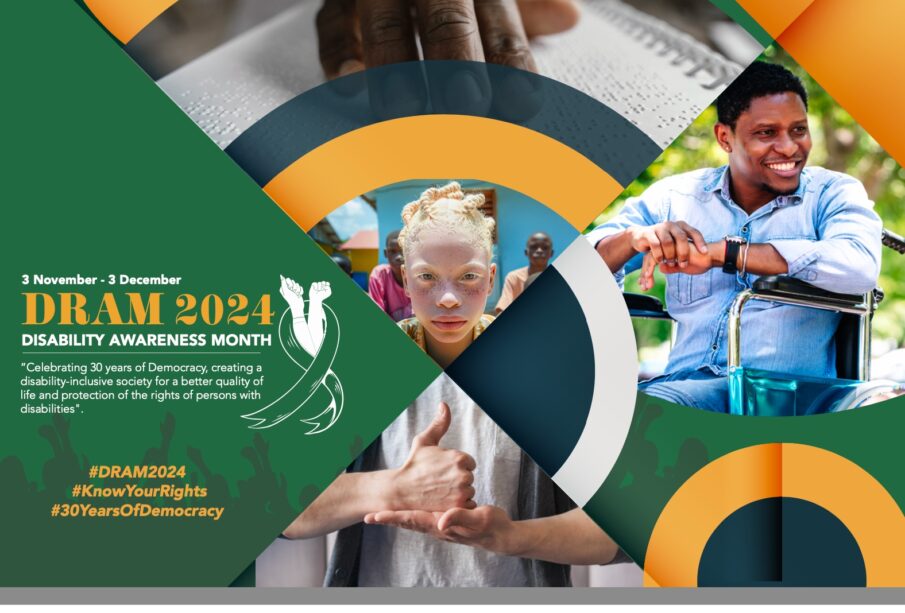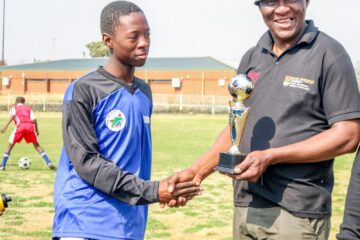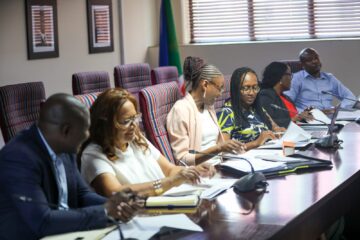GOVERNMENT URGED TO PRIORITIZE EDUCATION AND EMPLOYMENT OPPORTUNITIES FOR PERSONS WITH DISABILITIES

- At a ceremony in Cape Town on 4 November 2024, a report on disability rights was handed over to Western Cape’s MEC of Social Development, Mr. Jaco Londt, following extensive consultations with stakeholders in the disability sector.
- The report calls for increased investment in education, skills development, and employment opportunities for persons with disabilities, stressing the importance of accessible services and assistive devices for independent living.
- Disability rights activist Chaeli Mycroft, sharing her personal experience, highlighted the financial burdens faced by families of persons with disabilities, urging the government to address these challenges through enhanced social support and inclusive policies.
Yesterday in Cape Town 04 November 2024, various government departments work tirelessly to finalize the Medium-Term Development Plan (2024-2029) and individuals as well as organizations representing persons with disabilities have called on both the government and private sector to prioritize education and employment opportunities. They argue that these are essential for the full inclusion of persons with disabilities in every aspect of South African life.
This call to action emerged in Cape Town during a report handover ceremony, where Deputy Minister of Social Development, Mr. Ganief Hendricks, officially presented the findings of public hearings to Western Cape MEC of Social Development, Mr. Jaco Londt. The event, attended by over 90 representatives from government and civil society organizations in the disability sector, marked a significant step in advocating for greater inclusion of persons with disabilities in South African society.
The report, a result of extensive consultations with disability organizations and individuals, outlines key recommendations for the development of the Draft Policy on Social Development Services to Persons with Disabilities. Among the most pressing issues raised is the need for government to invest in education, skills development, and employment opportunities for persons with disabilities, alongside the provision of assistive devices such as wheelchairs and hearing aids to promote independent living.
The report is structured around several province-specific thematic areas, including:
- Mainstreaming, Inclusivity, and Accessibility – The establishment of municipal advisory offices to promote accessibility and inclusivity at the local level.
- Education, Capacity Building, and Skills Development – A proposal to scale up training programs on the use of assistive devices for persons with disabilities and their caregivers.
- Employment and Socio-Economic Empowerment – A recommendation for tax rebates on assistive devices and financial support for families advocating for accessibility.
- Social Development Support Services – A suggestion to introduce differentiated disability grants, tailoring financial support to meet the individual needs of persons with disabilities.
Deputy Minister Hendricks referred to the 2022 census data, which estimates that 3.3 million persons with disabilities, or 7.5% of the South African population, live in the country. “This data underscores the fact that persons with disabilities are a significant part of South African families and communities. Many of us know someone with a disability, which makes it even more important for all of us to work together to build a caring and inclusive society that allows persons with disabilities to thrive and contribute to our nation,” said Hendricks.
He also emphasized that the high-level action plan outlined in the report will be regularly monitored to ensure accountability and implementation by all provinces and key stakeholders.
During the ceremony, disability rights activist and co-founder of The Chaeli Campaign and Chaeli Foundation SA, Ms. Chaeli Mycroft, shared her personal journey, drawing both applause and tears from the audience. Mycroft, who has cerebral palsy, spoke about the significant financial burdens faced by individuals and families caring for persons with disabilities. She highlighted the lack of adequate support from existing social grants, which, she argued, condemns many persons with disabilities to lives of poverty and social exclusion.
“Disability is very costly,” Mycroft said. “The additional expenses that families face in supporting persons with disabilities are not adequately met by current social grants. This is why persons with disabilities struggle to live independently. Government must increase its investment in education and employment opportunities for persons with disabilities to ensure a more inclusive society.”
Chaeli Mycroft, a globally recognized disability activist, has received numerous awards for her work, including the International Children’s Peace Prize in 2011 and the Peace Summit Medal for Social Activism. She is also the first female quadriplegic to summit Mount Kilimanjaro, the highest free-standing mountain in the world.
In a significant move towards inclusivity, the ceremony was officiated in sign language by Jabaar Mohamed, Western Cape Provincial Director of DeafSA. Last year, President Cyril Ramaphosa made South African Sign Language the 12th official language in the country.
This report handover is the first of nine that the Department of Social Development will present to provinces across South Africa as part of National Disability Rights Awareness Month, observed annually from 3 November to 3 December. The campaign aims to raise awareness about disability issues, assess progress, and celebrate the contributions of persons with disabilities in South African society.















